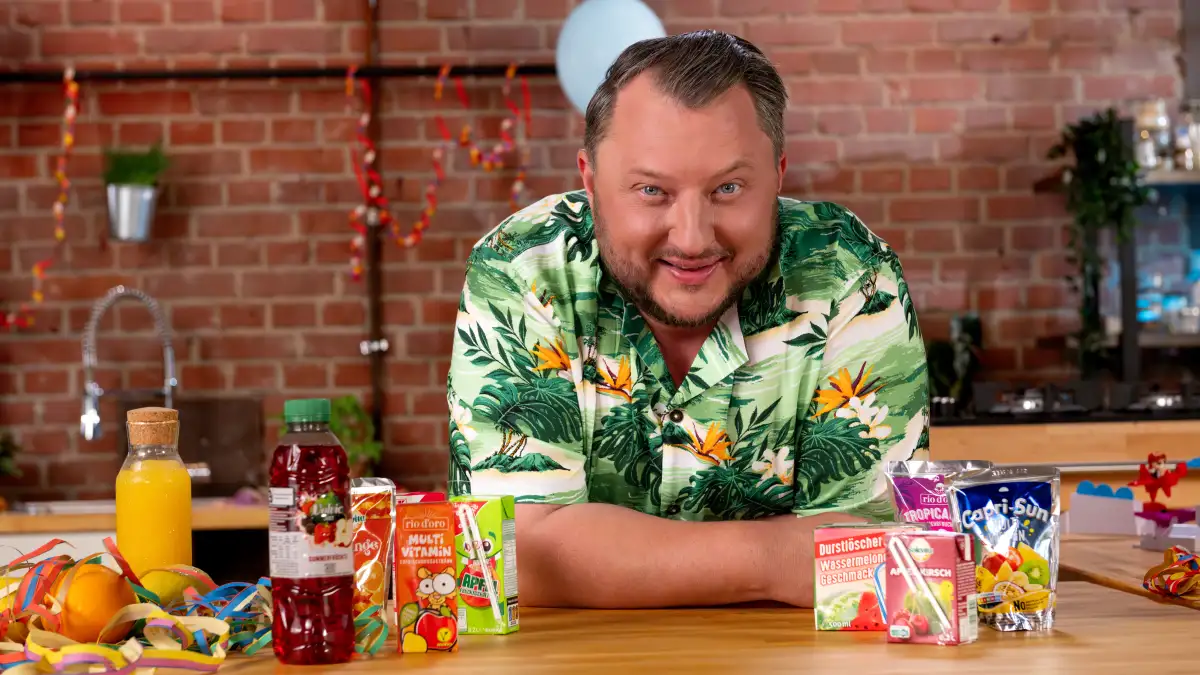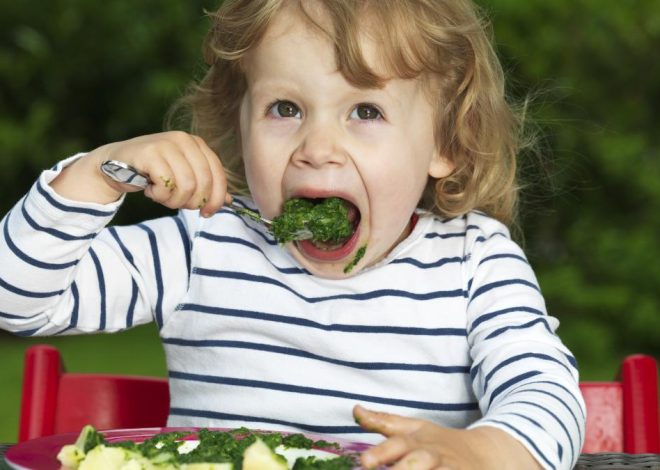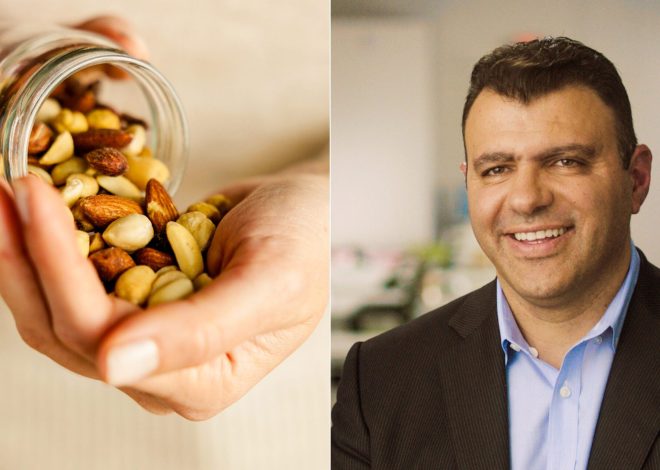
TV chef Sebastian Lege on nutrition and fast food
Mr. Lege, what did you have for lunch today?
Sebastian Lege: This afternoon I ordered Arabic food for all my colleagues and myself. I’m actually on a keto diet to lose a few pounds.
What is a keto diet?
This actually trains the body to feed on fat cells. You don’t eat carbohydrates, but only a high-fat diet to get energy from the fat cells.
And that works?
So far, it’s been pretty good. I’ve tried a lot of things, and my obesity isn’t caused by sweets or ice cream, but simply by eating too much good food. I cook too well and love it too much, and often very honestly and very hearty. And it shows.
How often does TV chef Sebastian Lege cook his own meals?
Oh, I was just cooking yesterday. I made cabbage rolls out of Chinese cabbage, added some cream and put it all in the oven. I have several kitchens at home, and they have to be used.
Why do you have several kitchens?
A studio kitchen and then an outdoor and indoor kitchen. My wife can choose what she wants. We cook very internationally, rarely just German. We don’t eat any processed food. We have lots of vegetables in the garden and an LED farm in the kitchen for salads and microgreens, i.e. seedlings. I built a four-meter-long raised bed in the garden, which is currently being filled. And we also grow our own fruit.
It almost sounds like you have your own nursery in the garden.
No, no, it’s not quite like that. Everything is designed in such a way that it grows by itself and we don’t have to do much.
TV viewers know you from the ZDF show, where you work as a chef and product developer, examining food and fast food and explaining how it is put together. But that was certainly not your career aspiration, was it?
Exactly, you can’t plan that. I grew up in Achim and when I was 15 I started a classic cooking apprenticeship in Verden at the Grüner Jäger, which doesn’t even exist anymore. Then I worked as a chef in many restaurants and hotels, including the Bremer Ratskeller and in many hotels internationally. Then I went to Herta as a developer, which belongs to Nestlé. That was very successful, but I also worked independently on the side and for a while I could hardly keep up with the requests. Until the banking and global economic crisis stopped many orders.
But you have remained loyal to the industry?
I got a very nice reference and applied for a job in the food industry. That worked out well in product development, I was really encouraged there. Until one day I had the TV chef Nelson Müller on the phone when I was selling fish to restaurants on the side. We chatted for a while and I told him what I actually do full-time. And he was looking for a product developer like that for his show – that was my zero hour on TV on ZDF.
What is the name of the show?
“How good is…” with Nelson Müller. I was his sidekick, his partner, for three years. And then I got my first show: “The tricks of the food industry”.
You’re on television so often these days that it feels like you’re doing several shows at the same time.
That’s not entirely wrong. I currently have twelve primetime shows, eight of which are on ZDF and four on Vox. And then there’s the YouTube channel.
You can’t have planned a television career like this.
I really stumbled into it a bit. But I also have the genes of my grandfather, who was also a very stage person and known for entertaining.
Were you also the class clown at school?
Anyway, I always say I had untreated ADHD. I had trouble concentrating, but I could always entertain people. I’m the only one who didn’t get smart until after school.
With your colorful shirts and flippant sayings, you seem like someone who is never embarrassed by anything.
No, I don’t really care what other people think of me. I think the more true you are to yourself, the more authentic you appear. That is also a part of your credibility. And if you don’t stand out on TV, you’ll quickly be forgotten.
How do you come up with your flippant sayings?
It all comes from me, I don’t have an author who writes things down for me. It’s all me – the camera rolls, I get going. I have a healthy level of self-confidence.
They take apart the products of large food companies, and the manufacturers rarely come out of it well.
Yes, but all the products we have ever examined were still sold afterwards.
You would think that consumers would be put off by some products and stop buying them.
But just go to Rewe in Achim, there are still canned ravioli and Knorr-Fix packets on the shelves and people are eating them. The general rule for these products is that all advertising is advertising, even if the products are poorly presented. The main thing is that they are mentioned on television.
Do you get feedback from the companies when you expose products?
Yes, but not in a negative way. They would rather have me optimize their products and hire me as a consultant. But I have so many projects that I’m full for the next three years.
And aren’t you disappointed with your TV viewers that they continue to buy ready-made pizza, even though it didn’t do well on your show?
It’s enough for me if I can make people aware of nutrition. Children in particular love the shows, I get a lot of feedback. It’s the best confirmation when parents write to me saying that their children remind them when they go shopping. And that they avoid highly processed foods and are willing to use the time to eat a balanced diet. That they don’t just see food as a way to combat hunger, but develop a feeling for taste.
Are convenience foods and quality mutually exclusive?
No, there is well-made ready-made food. It is sometimes even better made than homemade food. But you should avoid highly processed foods. In other words, all products that contain more than four ingredients. We humans are not made to eat chemical burgers, but rather a piece of meat, a potato or a carrot, i.e. unprocessed products. Many diseases are caused by extremely processed products. On average, we all eat a plastic credit card every month because there is so much microplastic in the various foods. If you are prepared to invest more money in good nutrition than in your car and buy groceries from local suppliers, then you are already doing a lot right.
Do your broadcasts contribute to this?
I think so. I buy a lot from farmers in the area. One has poultry, another has beef, a third has pork. I buy my meat from them. I don’t buy meat from the supermarket, I can’t eat it.
However, they also have the financial means to buy organic food there. Not everyone can do that.
But you don’t have to eat meat every day. It’s enough to make pasta with a fresh tomato sauce and grate parmesan on top. Or you can cook a risotto. I also find banal dishes really tasty, you just have to make the effort to invest a few minutes of your time. That’s the problem: most people don’t want to invest time in eating and cooking.
That sounds simple.
Yes, that’s it. I want children to develop their taste again. What does a tomato taste like, what does a potato taste like? Taste theory would be a great subject for schools. Teach children how important cooking is, so that they develop a passion and an emotional connection to nutrition. You could also send cool chefs to schools to promote food. So that the kids get the feeling that McDonald’s can’t compete with home-cooked food. It’s about creating superlatives in nutrition.
When was the last time you went to McDonald’s?
I’m just thinking about it. The last time I was at Burger King was at the airport in Kuala Lumpur. There was nothing else.
And it tastes good even though you know that the burger doesn’t contain what the advertisement promises?
Oh, I’m just a normal person. You have to keep things in perspective sometimes. You don’t have to eat it every day, maybe two or three times a year. There’s nothing wrong with that.
Is there good fast food?
What is fast food anyway? Just think of sushi. Everyone thinks it’s totally healthy. But sushi has an abysmal Nutriscore. It’s full of sugar and starch, it’s full of calories. What I mean is: there are so many products that you think are healthy – but often the opposite is the case.
Do we Germans have a problem with good food?
At least we are not as emotional about food as the Italians or the French. For us, food is not the main focus. We have asparagus, goose and kale season and that’s it. In Italy and France, food has a different value.
What would you recommend for this weekend, what should be on the table?
I’m a big fan of Sunday roast. But you should make sure you buy it from a local farmer or butcher and not from a discounter. That would be my recommendation.
The interview was conducted by Mathias Sonnenberg.
To home page

Ethel Purdy – Medical Blogger & Pharmacist
Bridging the world of wellness and science, Ethel Purdy is a professional voice in healthcare with a passion for sharing knowledge. At 36, she stands at the confluence of medical expertise and the written word, holding a pharmacy degree acquired under the rigorous education systems of Germany and Estonia.
Her pursuit of medicine was fueled by a desire to understand the intricacies of human health and to contribute to the community’s understanding of it. Transitioning seamlessly into the realm of blogging, Ethel has found a platform to demystify complex medical concepts for the everyday reader.
Ethel’s commitment to the world of medicine extends beyond her professional life into a personal commitment to health and wellness. Her hobbies reflect this dedication, often involving research on the latest medical advances, participating in wellness communities, and exploring the vast and varied dimensions of health.
Join Ethel as she distills her pharmaceutical knowledge into accessible wisdom, fostering an environment where science meets lifestyle and everyone is invited to learn. Whether you’re looking for insights into the latest health trends or trustworthy medical advice, Ethel’s blog is your gateway to the nexus of healthcare and daily living.



